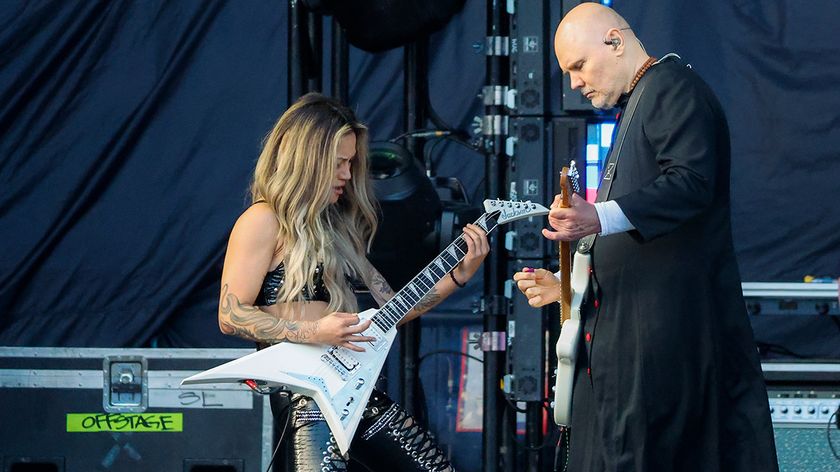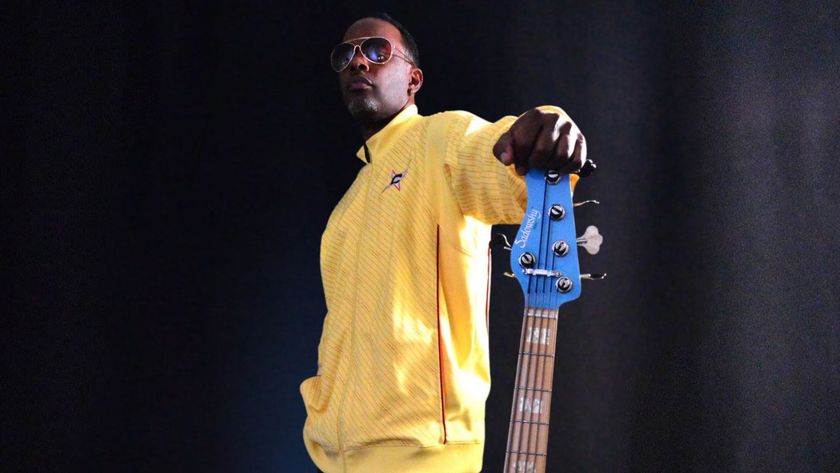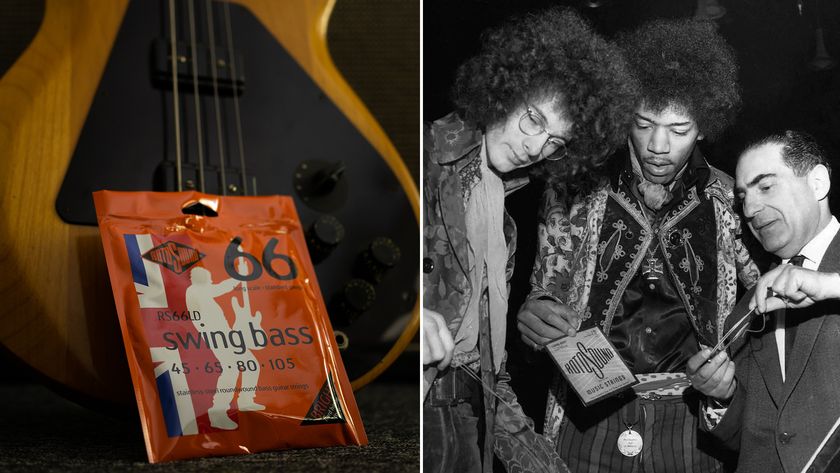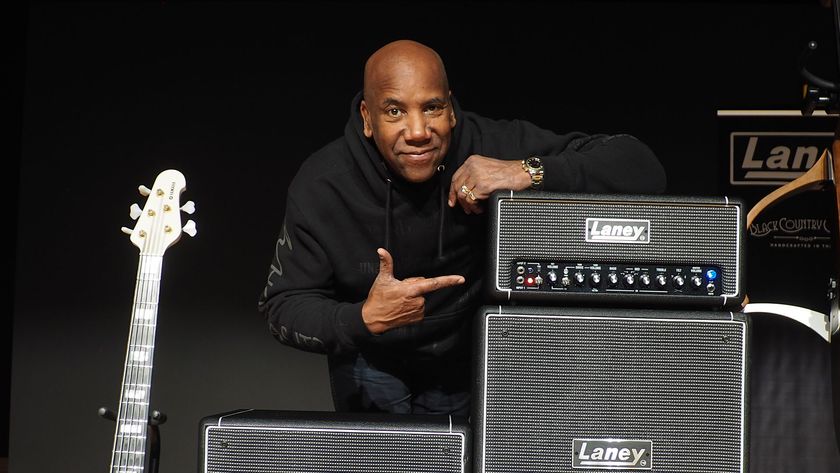
For most, the term "progressive metal" immediately brings to mind images of guitar-school wankery, production sheen and bloated concepts.
While vocalist/guitarist Paul Masvidal will be the first to tell you he doesn't identify with the "progressive" or even the "metal" tag when it comes to Cynic's music, they are nonetheless one of the bands truly pushing heavy music into new and exciting territory.
Cynic first made a dent in 1993 with their debut album, Focus, an album that fused alien guitar sounds, jazz and death metal into something that had listeners equally scratching and banging their heads. Disbanding a year later, Cynic had become a cult favorite among metal fans by the time they reconvened to record 2008's Traced In Air, a critical success in spite of 15 years' worth of expectation.
Fingers crossed, we won't have to wait another 15 years, and 2012 will bring us a new Cynic album. In the meantime, the band have just released an EP of all-new material titled Carbon-Based Anatomy. We recently caught up with Paul Masvidal to get the skinny behind the new EP and the plans for a new full-length later this year.
GUITAR WORLD: Why did right now seem like the right time to put out an EP? I know the band is working on a full-length, but were you starting to feel like it had been too long since Traced In Air?
Yeah that's what our managers thought. They thought it would be good to get something out, so we went to work. We were working on the album, which is written also, and I had all of this material and decided to put out [the EP] because it would come out in 2011. For me, it's a record. Althought it's 23 minutes, it's got everything. It just happens to be shorter than your average album, but it's all there. To me it's just another Cynic album.
I was going to comment on the fact that it feels like a fully realized piece of music, not just the random assortment of songs bands sometimes put out as EPs.
Get The Pick Newsletter
All the latest guitar news, interviews, lessons, reviews, deals and more, direct to your inbox!
I think the whole deal's there. It'll go down as a real Cynic album, just getting over the symantics of "album" and "EP."
The way people are releasing music these days, the line is becoming more and more blurred.
Totally. Our next record might be two EPS buckled together, you know what I mean? People are downloading a tune at a time and all that. Our music is so dense that I think you lose a lot if you put too much music on it. I'm all about quality over quantity. I think it's more about what's going on within the music and not how long it is. It's really easy to make things long.
The tracks with lyrics seem to have some thematic elements in common. A lot of the lyrics tend to focus on the frailty of the human condition. Did those similarities factor into choosing the songs for the EP?
I don't know. I think we just had a bunch of tunes that weren't going to be on the next album. I looked at a bunch, and Sean [Reinert, drummer] and I did some quick demos, and we ended up choosing the ones that made the most sense. It was more instinct driven. I think that's what drives a lot of our processes. It's not really an intellectual process, it's feeling based. Those songs felt right.
You've said before that Cynic's songs usually start off as acoustic and vocal demos. What's the next stage in the songwriting process?
I usually give that to Sean. It's kind of a rough arrangement and lyric, and the basic melody and chord changes of the song. Sean will kind of live with the demo for a little bit and then we'll get in a room together and play, just improvise and explore.
A lot of this EP was improvisations. It's all experiments and ideas, and then picking things we like out of all these little demos. Then things become a bit more formalized. It's a lot of back and forth, adding and subtracting.
There's a lot of textural guitar playing on this EP. Who are some of the more left-field guitarists that are influencing that part of your sound? It might just be me, but I think I hear some Jonny Greenwood in there.
I like Jonny; I think he's really creative. Of course, Kevin Shields has always been a big inspiration. I was always a My Bloody Valentine fan, so a lot of the shoegaze scene. I'm also a fan of a lot of folk artists, Elliot Smith and a lot of these fingerpicking guys. I have a friend, Juana Molina, I really love her work. José González is really cool.
I think I've always been a fan of layered tapestries of sound without any specific, you know, "Here's the riff." It's more like this wall of color, and then that becomes the riff. That's always been part of our process. Even with Focus, we intentionally didn't pan hard left and right. We kept things more in the middle so it would sound like one color.
For a band that gets classified as a progressive metal band, I like that your albums can sometimes feel like really heavy Brian Eno pieces rather than just conforming to the usual, overly-busy tenets of the genre.
Eno, of course, is a huge one for me. His ambient records especially were big for me. People always try to put us in a box when it comes to genre, but I don't really hear us as metal or rock, you know? It just kind of becomes the sound of the band. I guess it's helpful to be able to give a description, and at moments it does have a progressive metal quality to it, but then there's these other moments that are totally something else.
But I don't know what progressive metal is. Is it Dream Theater? [laughs] Because if it is, then we're not remotely close.
I definitely a distinction between Progressive metal with a capital "P" -- all the bands that sound like they come from a similar tradition -- and progressive metal, which really is about taking the basic metal framework and pushing it into new sonic territories.
Exactly.
Talk about some of the gear you used during the recording of this EP. Did you mainly use your trusty Steinbergers?
The Steins and Fractal Audio, that's about it. It was pretty bare bones.
When did you make the transition to the Axe-FX unit? I know a lot of bands are making the switch because they're so convenient to take on the road.
Probably around '08. We used it for a lot of the clean sounds on Traced In Air and then from there on tour we've been using it ever since. Really since Cynic got back together, other than the '07 dates.
So looking toward the new year, you said the new album is almost fully written?
Yeah. I have a pool of stuff. How Cynic stuff happens is that at any given time, there's a lot of material laying around. I was starting to narrow it down in terms of maybe eight tracks. The acoustic demos are written for piles and piles of stuff, so I think the roots are there for the record, but who knows where it'll go when I take it in with Sean and we start really fleshing it out.
When picking the tracks, are you looking for ones that fit together into sort of a cohesize narrative? Not so much sounding the same, but maybe working together to tell a story?
For me, my favorite records take you on a journey. They start somewhere and then leave you somewhere else. I think I approach records that way, where I want it to be an experience. I want the record to take you on a ride, that's really the approach. Thinking about it as one kind of experience that leads you down a road that you might not expect, lots of twists and turns. Ultimately, something interesting and fun to listen to.
When do you think the full-length might come out?
I don't know. Maybe this summer, if we're not touring all year. But the summer, that's the plan.
Cynic's new EP, Carbon-Based Anatomy, is out now.
Josh Hart is a former web producer and staff writer for Guitar World and Guitar Aficionado magazines (2010–2012). He has since pursued writing fiction under various pseudonyms while exploring the technical underpinnings of journalism, now serving as a senior software engineer for The Seattle Times.
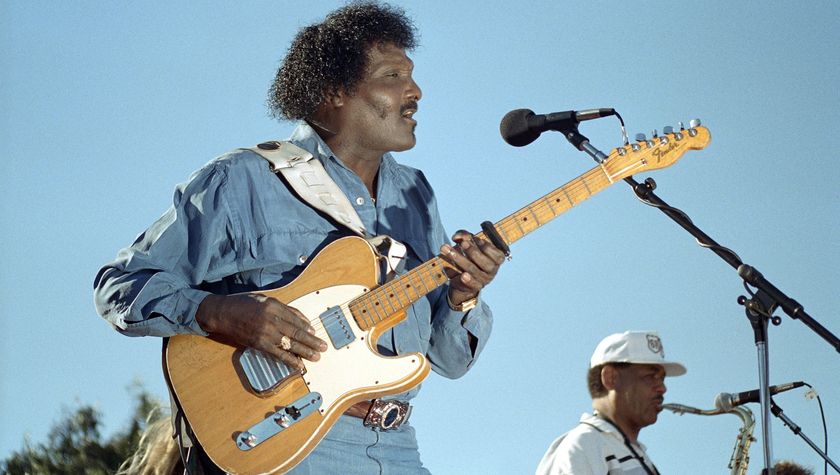
“Freddie King would ask me why I never tried using thumbpicks – I just couldn't play with one”: He took Jimi Hendrix's place in Little Richard's band, was idolized by Stevie Ray Vaughan, and is one of the most overlooked Telecaster slingers of all time

“If any song can unite all generations of rock guitar fans, this is it”: March 2025 Guitar World Editors' Picks

